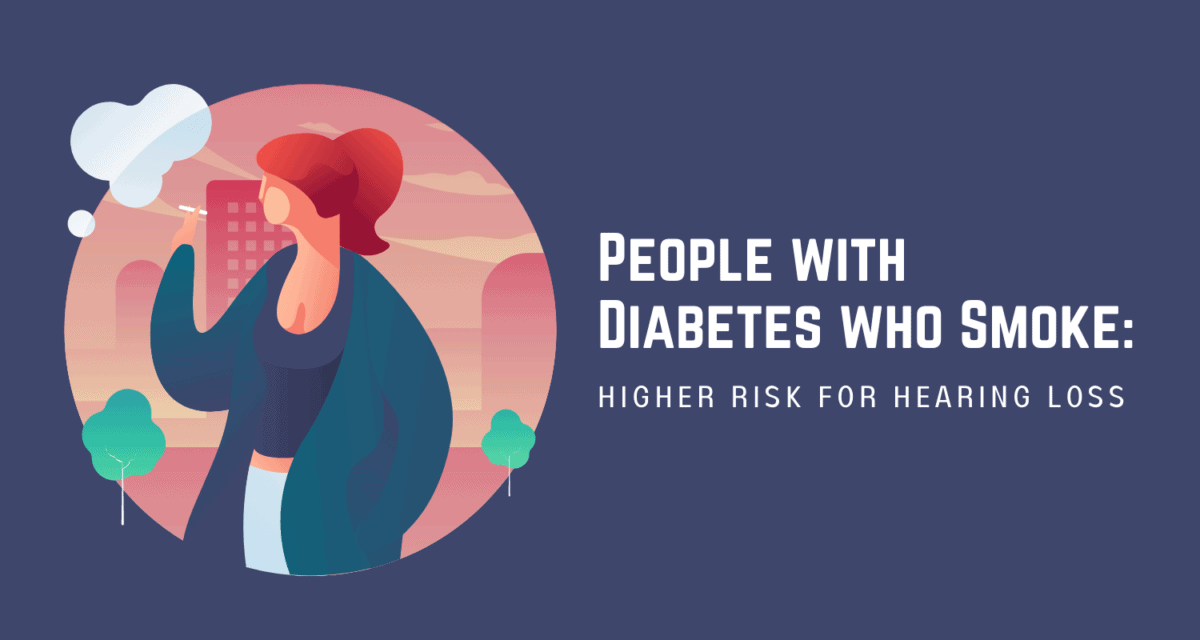Everyone knows what cigarette smoke is bad for you. But not everyone knows that smoking can lead to diabetes. And if you smoke and have diabetes, you have a much higher risk of hearing loss! Let’s take a closer look at how smoking, diabetes, and hearing loss are related.
Smoking and Type 2 Diabetes
Smoking cigarettes is bad for your health. It can cause cancer, heart disease, lung disease. The nicotine in cigarettes can also impact your cells, making the cells less responsive to insulin. When cells in the body don’t respond to insulin, blood sugar has a hard time entering cells, and blood sugar levels rise. According to the CDC, people who smoke are up to 40% more likely to have type 2 diabetes compared to people who don’t smoke. And the more you smoke, the greater your risk of developing diabetes.
Smoking, Diabetes, and Hearing Loss
So what does this have to do with hearing loss? A recent study looked closely at the effects of smoking and diabetes on hearing loss. The Korean study used national data of more than 33,500 adults and found that 12,570 adults had age-related hearing loss.
The researchers found that the most prevalent risk factors for hearing loss were being male, being exposed to occupational noise, smoking, and having diabetes. However, the most synergistic effect was among people with diabetes who also smoked. These two factors together had the most significant effect on hearing health. Adults who smoked and had diabetes were far more likely to have age-related hearing loss.
Both smoking and diabetes can disrupt blood flow and impact cardiovascular circulation. The cells throughout your body rely on a steady supply of oxygenated blood to stay healthy. When something disrupts circulation, the cells can be damaged or even die. The cells in the ear are particularly sensitive to these changes. And once the cells in the ear are damaged, they can never be restored. That’s why hearing loss is permanent and irreversible.
Quitting Smoking
The study found that current smokers who had diabetes were much more likely to have hearing loss. However, people who had diabetes and no longer smoked didn’t have as high a risk of developing hearing loss. So quitting smoking, even if you’ve been smoking for years, can lower your risk of hearing loss.
People with diabetes who quit smoking had lower rates of hearing loss than people with diabetes who still smoked. Quitting smoking can reduce the chances of developing hearing loss, improve circulation, and improve the health of your ears.
Managing Diabetes
Another way to improve your health and reduce your risk of hearing loss is managing diabetes. Dietary and lifestyle changes, such as eating a balanced diet and being physically active, can help you manage diabetes. If you take insulin, testing your blood sugar levels regularly and sticking to your insulin schedule will help you manage diabetes and improve your overall health, as well as improving the health of your ears.
People with diabetes often experience hypertension or high blood pressure as well. This puts additional strain on the ears and can contribute to cell death in the inner ear. Along with managing diabetes, monitor your blood pressure. Taking care of your overall health will benefit your ears, and you’ll lower your risk of hearing loss.
Treating Hearing Loss
If you have hearing loss, it’s time to treat your hearing loss with quality hearing aids. These devices are a fantastic option for many people. Hearing aids amplify the sounds you’re missing. But that’s not all. They’re programmed to match your unique hearing needs, so not every sound is amplified equally. If you can hear clearly in a certain range, your hearing aids won’t amplify that range. And if you need extra help in another range, your devices can provide extra amplification in that range.
Hearing aids offer custom programs and settings that help you hear in different listening environments. Whether you’re at home, in the car, or at a restaurant, your hearing aids will easily transition through all these scenarios. Many of our favorite hearing aids even come with Bluetooth technology for wireless connectivity. Visit us today and find out more about your next set of hearing aids.


